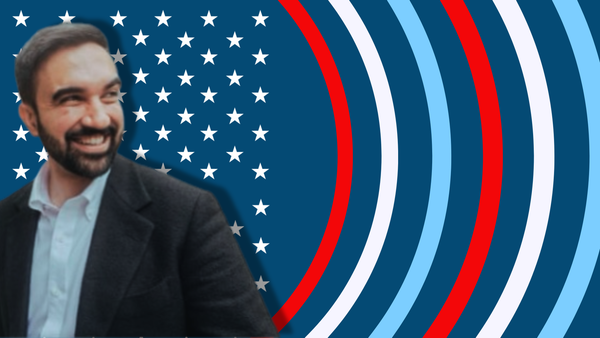Sports gambling apps are tearing an important part of the American social fabric

I worry America cannot survive this. “This” can mean many things. My This, for today at least, is sportsbetting.
Don’t catch a tizzy; I’m aware that gambling on sports isn’t new. As far back as we can see evidence of spectator sports, we can find evidence of gambling. On every continent, at any time anywhere in history, among almost any people, sports seem to have existed (at least in part) to facilitate gambling.
Modern sports are no exception to this. But they are different in a very new way. Beginning in the late 19th century then ramping quickly through the 20th, contemporary sports culture has become something completely new in the history of the world. Organized teams form leagues within which they compete for some magic combination of popular attention and the sheer joy of achievement itself. And money, of course; that’s implied by popular attention. Attention means eyeballs, and much like movies and television, the sports industry is driven by advertising. But it’s not all about money. The “sheer joy of achievement” is an irreplaceable part of the why for the athletes, just as it always has been.
And while gambling has been part of modern sports since the beginning, throughout most of the last century and change, gambling has been tightly, geographically controlled. At least in the US, you went to a bookie. Depending on where and when you were, that bookie might be an illegal one. If not, they worked for a casino. The bookie had an assortment of pre-selected wagers you could choose from. These wagers were chosen because they maximized the house’s chance of winning. Unlike regular casino attractions—roulette, craps, slot machine trimmed in neon to hide the drying puddles—sports betting is something you can be good at. For casinos, it’s a loss leader. They hope they can get you in, grease your wheels, and roll you out onto the floor where you’ll lose money more reliably.
So it’s money and achievement for the players and team owners. It’s gambling for the gamblers. None of this is new at all, even if the scale is radically larger. No. The real innovation of modern sports is for, by, and from the fans. It’s culture.
The limitations of location and legality allowed spectator sports to evolve into a new social role in developed economies. Teams became the gravity well around which a tight orbit of culture coalesced. Neighbors became fans, who became tribal affiliations that passed the love along to the next generation, creating new artifacts of culture along the way.
Critically, the real stakes on this are almost zero. Yes, when Auburn lost the Iron Bowl in 1999, I went to bed crying. Yes, when Auburn lost the Iron Bowl in 2014, I at the very least wanted to go to bed crying. It matters a lot to my heart that Auburn beats Alabama as often as possible. But I don’t actually hate Alabama. Not in a way that matters. Not in a political way. So the real stakes are fake, but the fake stakes are very real.
Culture. And if you’re part of it, you can take it almost anywhere. There’s nowhere in the southeastern United States I can’t find a conversation partner over college football. None.
But in 2018, the Supreme Court issued a ruling that changed something. Murphy vs. The NCAA overturned a federal law that had sharply limited sportsbetting outside of Nevada. Before this, sportsbetting was the tightly controlled side hustle for mobsters and casinos we talked about before. Now you got it in your pocket. It’s pinging your watch. You tapped the banner by accident and now you’re looking at parleys on Indian Professional League cricket when you don’t even watch baseball for real, let alone its strange cousin. Sports is a different thing for you now. You’ve got money in it.
The real stakes have risen. The fake stakes are fading.
I want you to imagine sports culture in the United States as a third space. There’s been enough public dialogue around third spaces that they probably scan well enough to make my point. Third spaces—churches, coffee shops, parks—are neutral places where you don’t have to spend much money to socialize. They’ve been disappearing in recent decades. Or rather, they’ve been monetized.
Imagine sports this way, but as a conversation. America can be a contentious place. Especially at the moment, the political climate hasn’t been so tenuous since my parents were children. In fact, I think you could make the case that politics has become totalizing in a way that wouldn’t have even been possible before. Almost any touchpoint between strangers is a potential live wire. Between you and every new acquaintance are dark floodwaters and very little dry ground.
And clearly, that’s not without reason. We have much to work out politically and the project grows larger every day. But we are a country. It’s more than just nice to be able to establish a rapport with strangers on dry ground before you wade into the murkier, infested waters of more familiar conversations. Small talk is something we all complain about, but it’s vital to the orderly function of a society.
And sports—the culture, the shared language, the harmless thrill of a cosmically meaningless rivalry, the joy of solidarity in meeting one of the tribe far from home—is small talk par excellence. Rapport without risk, common matters without conflicting meaning, connection without stakes.
Speaking of stakes:
There’s a reason it’s also a gambling term. To put very bluntly what I’ve already pirouetted around, modern team sports create an entertainment and cultural product that is largely divorced from real social stakes. Especially in the United States, team sports are almost completely siloed from partisanship, religion, class, and race. They do have a historical gender polarization, but that’s been breaking down with little fanfare for decades (though trans panic absolutely threatens that).
Gambling reintroduces stakes. Very, very real and immediate stakes. Two strangers who were once fans now have more than just emotional skin in the game when they find themselves chatting about the match last night. The role of sports as small talk par excellence is eroded by the introduction of money on the line.
Small talk is a social game of critical importance, and the reintroduction of live stakes so universally across the culture radically alters the nature of that social game. Those two strangers aren’t just shooting the breeze, arguing balls and strikes, or playing armchair quarterback anymore. Now, they’re comparing lines, parleys, trading rumors of injuries. They’re talking about dollars, not defensive lines.
This also quickly slides into trading the most rapidly inflating social currency of our age—conspiracy theories. Did the receiver go down before crossing the goal line because it was the high IQ play, or did he do it to keep the over from hitting? Did the ref make a bad call or is she on the take?
None of this matters to the villains of this story. The apps don’t care about the social fabric. They don’t even really care about sports all that much. Caring isn’t in their wheelhouse; profit-seeking is.
You shouldn’t really be able to do this. Not with sportsbetting. Recall what I said about casinos. Sportsbetting is a loss leader in a casino. It gets you in the door, maybe gets your appetite whetted and a little alcohol in your mouth, and hopes you’ll mosey on down to the casino floor where the house makes the real money. The profit margins on sports gambling are thin because you can actually be good at it, if you know the sport well. This is not a lottery ticket. It’s an educated guessing game. You won’t get rich, but over the course of a season, a seasoned bettor can walk away pretty reliably in the black.
The apps know this. They planned for it. They compensate for it with two mechanisms:
- If you’re a good bettor, they’ll ban you. Sometimes without your payout.
- They’ve deployed the full force of attention-mongering the smartphone allows.
The former is tasteless. Unsportsmanlike, even. But it’s a regular occurrence. It should be noted that this is essentially discrimination against the sober. A “good bettor” isn’t likely to take wild swings on 5-leg parleys or even bet on a sport they don’t understand. They’re not playing to win this or that wager, or even this particular gameday. They’re playing to walk away holding a larger roll than they started with at the beginning of the season. It’s methodical, surprisingly reliable, and (for the app) completely and horrifyingly unprofitable. So they ban sober bettors who win too much.
The second is where the danger is. It uses the logic of online gaming (itself suffering from a slightly different gambling problem), social media, and psychology to intentionally wrangle the attention of its users. This is the purposeful creation of a new class of addicts. Their interminable disclaimers about the dangers of addiction don’t matter when you can just opt not read them because they harsh the vibe.
While it’s destroying the social role of spectator sports on the one hand, it’s creating endless personal tragedy on the other, and doing so at a scale that we will be reckoning with for a generation. Every dollar wagered on one of these apps averages to around $2 not invested in the bettor’s future. This is especially disastrous for young men, who are the near exclusive target of these firms. When someone talks to you about the “male loneliness epidemic” or any similar crisis specific to young men, make sure you ask them about their thoughts on mobile sportsbetting and crypto. If they’re more concerned about feminists than companies legally pushing algorithmic addiction, they’re not worth listening to.
This may all seem like a minor problem, but I don’t think it is. I think it’s one plank of the Omni-Problem. The Omni-Problem is that, over the last decade, we’ve tolerated an incredible flowering of scam industries. They each reinforce and feed each other. From sportsbetting to cryptocurrency to wellness schlock to, perhaps, social media itself. An inordinate amount of our collective investment, both in terms of money and attention, have flooded these new industries. None of them means well. We have to address them.
Taken together, I’m not sure America can survive this if we don’t.



